The inspiration for this article came to me after a conversation I had with a friend who recently became vegan, whoo! It’s also very fitting to talk about backyard eggs during Easter.
She listened to our podcast and was inspired by our vegan origin story. She went on to watch Earthlings and became vegan after she made the connection between her consumption behaviour and the exploitation of animals.
It was surreal to hear about her journey. However, there was just one tiny little detail that was interesting to me. She said that she was vegan, BUT still eats eggs from her aunt’s backyard chickens. So I guess she would consider what they now call a “veggan?”
On the surface, I can totally understand this position. It appears harmless to consume eggs from hens that have leftover eggs that could potentially rot away.
It seems impractical to waste food, where no harm is done to the chicken.
My friend’s story is not in isolation. I’ve heard about this position time and time again. “What about eggs from backyard chickens?” Or “I’m vegan, but I still consume eggs from my chickens at home.”
Then almost like destiny, Maša sent me this podcast episode from The Disclosure Podcast, where Earthling Ed breaks down the question, are backyard eggs ethical?
Ed, as always, made some excellent points, which inspired me to do some more digging. And digging I did.
I personally had so many questions about this and have finally taken the opportunity to answer all of them.
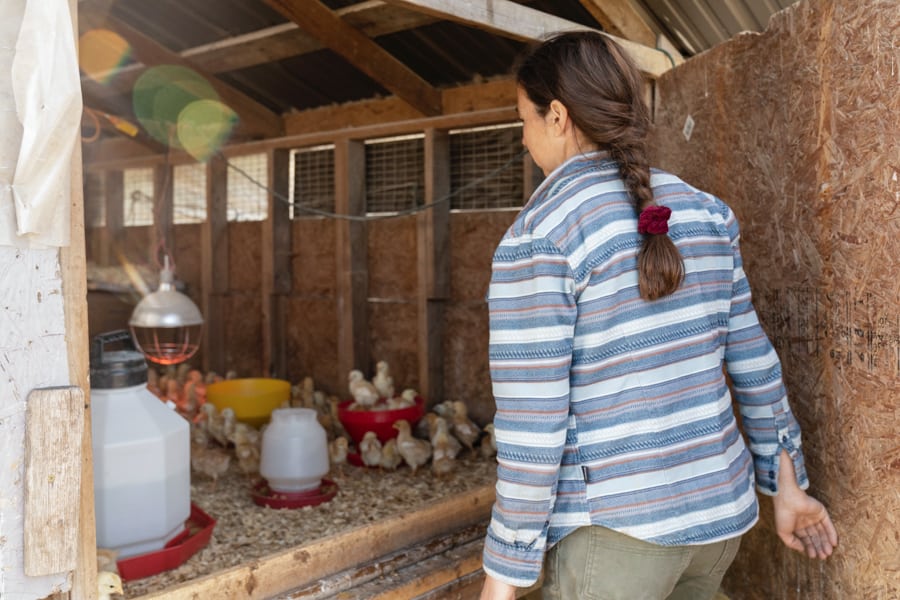
Where do backyard chickens come from?
Sourcing chicken is the first ethical consideration when it comes to backyard eggs. Where did they come from, to begin with?
Backyard chickens typically come from breeders. A simple online search for “backyard chickens” will link you up with breeders to purchase your chicken. These breeders are only interested in hens (female chicks) and crush up (or suffocate) day-old male chicks as they cannot reproduce, as they’re effectively useless to them.
Maybe you thought that breeders grow male chicks for their meat? As it turns out, the egg industry isn’t in the business to raise and care for chickens as the amount of time it takes isn’t profitable.
If you buy hens from farmers, you’re encouraging the suppliers to buy more chicks. It’s a supply and demand business. Farmers treat chickens like inventory. That’s why the accounting world refers to farmed animals as “livestock”.
At the end of the day, you’re still giving money to the hatchery industry and supporting the exploitation of birds. It’s as simple as that.
How many eggs do hens lay naturally vs hens that have been manipulated through selective breeding?
What shocked me was the drastic difference in numbers in what a wild red guinea fowl would lay compared to hens as we know them now. Naturally, they’re only meant to lay 12-20 eggs a year, and typically it would be in Spring. This is also for the purpose of reproducing.
When talking to Maša about this post, we couldn’t help but draw the comparison between hens and women. Think of how women on average have their period twelve times a year. Hens are also designed to go through that same process.
We’re essentially exploiting another species reproductive system for access to their eggs.
Looking at the numbers, in 1905, hens produced approximately 120 eggs a year on average. That’s a lot!
Brace yourself for what egg-laying hens produce now. 200-350 eggs a year! That’s almost one every single day. Staggering isn’t it?
I mean, consider this from a compassionate viewpoint, you start to question why we would do that to them. Ladies, imagine having your period pretty much every day of the year!
Chickens instinctively lay more eggs when their eggs are taken away from them. So when we take eggs away, we’re encouraging them to lay more eggs in what is called a clutch. A clutch is simply a group of eggs being produced by the hens in one period. So, the less we take, the less they lay.
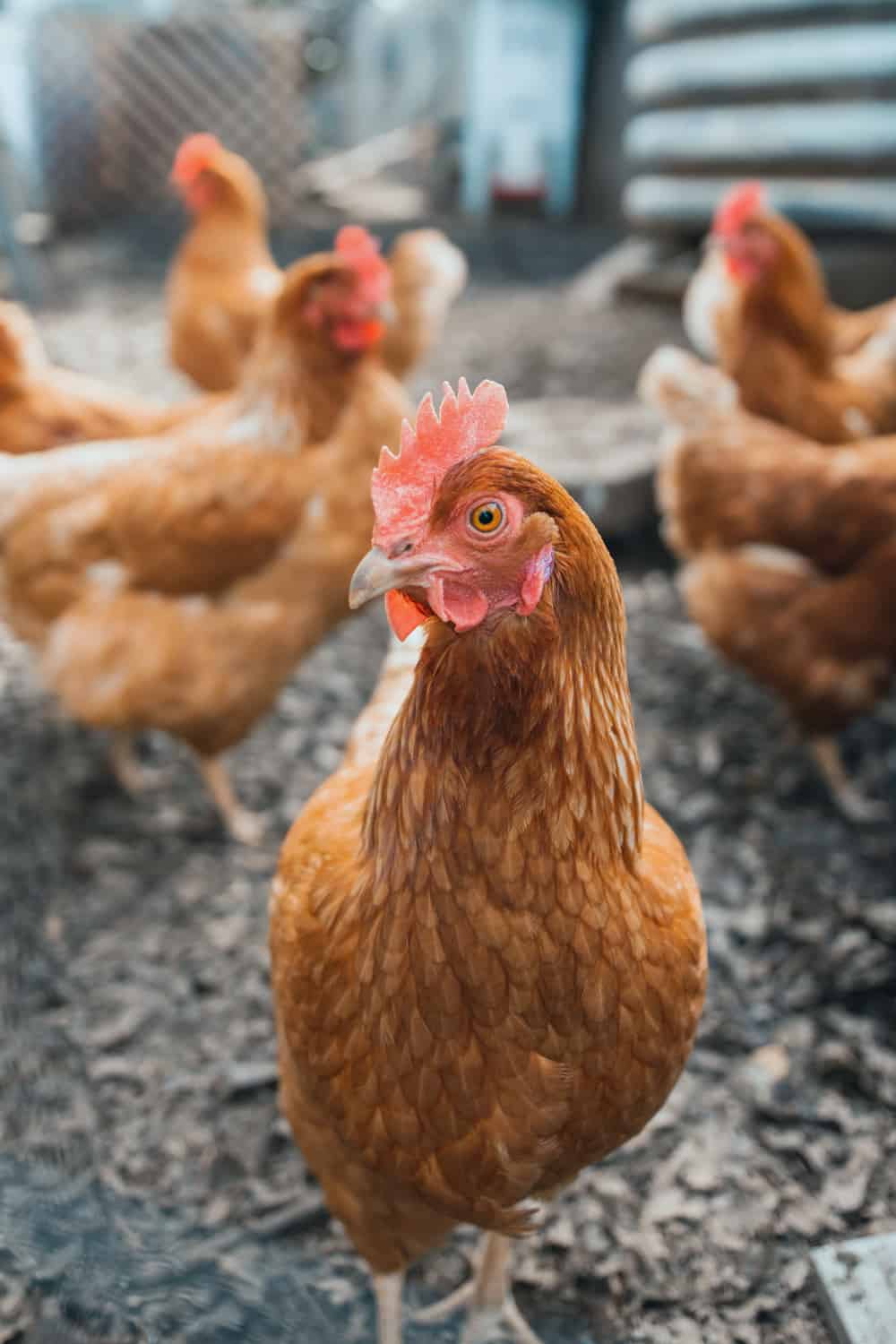
What is involved in chickens laying eggs?
So, let’s clarify something here. For a chicken to lay eggs that turn into chicks (fertilised eggs), a rooster needs to be involved for the hen to store the sperm in an internal cavity. During the egg making process before the shell is made, there is a step where the fertilisation happens. This is how a new chick is made.
In situations where no rooster is involved, this process is skipped (not entirely, but just nothing happens). These are the eggs that end up on our shelves in the shops; they’re not the chick hatching kind.
So much goes on for an egg to be produced inside a hen’s body, it’s downright extraordinary. If you’re interested in learning more about how eggs are made, this video demonstrates it nice and quick. Or if you’d prefer a more detailed one, here is another video.
For each egg a hen produces, they excrete 10% of the calcium (for the shell) that is stored in their bones. This is why you’ll often see egg-laying hens with weak or broken bones, osteoporosis or even paralysis.
You might also think (just like I did) that the feed they’re given replenishes those nutrients from passing eggs. Unfortunately, they’re not if you’re talking about the cheap feed that is given to them on egg farms and in backyards.
What I wasn’t aware of is that hens have a natural tendency to eat their own eggs to replenish the nutrients that are lost during the egg-laying process.
Even scrambling the egg and feeding it back to the chicken is a great idea; they get back what they lost. Another idea is to crush up the shells finely and bake them (to kill any bacteria) and feed that back to the chicken as well.
There are a few things that can go wrong with egg-laying chickens. Eggs can get stuck inside them, and unfortunately, if they break, it can get infected and they can die if gone untreated. One of the reasons this could be is because they don’t have enough calcium in their system to make a strong enough eggshell.
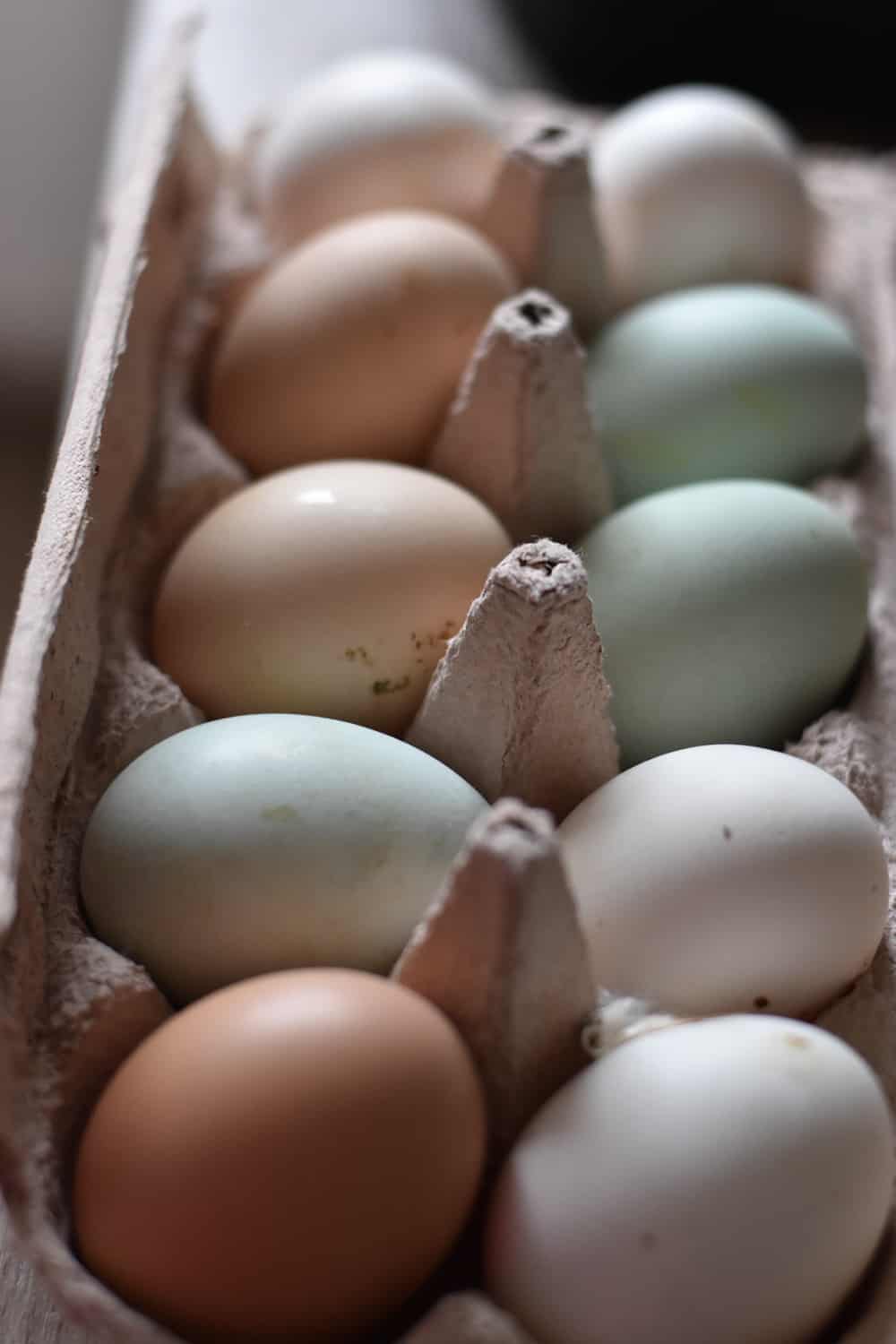
What is the life expectancy of a farmed hen vs a wild hen?
Wild (not farmed and exploited) chickens live between 10-20 years. In the egg industry, most chickens are slaughtered at 18 months of age. That’s after 12-16 months of rapid egg production.
As you can see, their life span is drastically shorter—as with any other animal that is being exploited for their bodies. Once a hen stops laying eggs, they’re sent to slaughter and used for all kinds of purposes.
This information is to give you a bit more perspective of the eggs that someone might buy in the supermarket. I would say that the hens that you have in your backyard would live longer than the battery egg chickens.
However, if we take their eggs, it triggers them to lay more eggs than what is biologically expected, thus reducing their average life expectancy.
What about a rescue hen?
Rescuing hens from factory farms or farms that are not looking after their chickens is a compassionate act. However, this depends on our intent to rescue them. Is it because we’re looking for a new pet, or because we’re looking for backyard eggs?
Now I know many of you might be thinking, why can’t I provide a safe and open environment for a rescue hen as a pet AND get a couple of eggs at the same time?
We need to shift the paradigm of how we view chickens. When we adopt a dog, for example, we do it out of the reciprocation of love. We don’t adopt a dog with the expectation of the dog producing food for us.
The moment that we expect to receive eggs from hens in return for looking after them e.g. feeding, space, companionship, this is effectively a business exchange. And whether we like it or not, that chicken is an asset, not a pet.
Are we prepared to support a backyard hen the same way you would a cat or a dog?
After a quick search, I found that a hen would only cost $20-$30 from a hatchery! It’s super cheap by any standard. We’re talking about a living creature.
Now if anything goes wrong and your backyard chick needs to see a vet, most people would dispose of that chicken and get a new one.
So I have a confronting question for all of us to ponder;
If a vet bill would cost $500 for your chicken if you had the money, would you pay it?
We fork out this type of cash for other domestic animals, but if we’re honest with ourselves, our associated value with a chicken is much lower.
That’s because, for most of us, our relationship with backyard chicks is seen as an exchange, not a loving companionship.
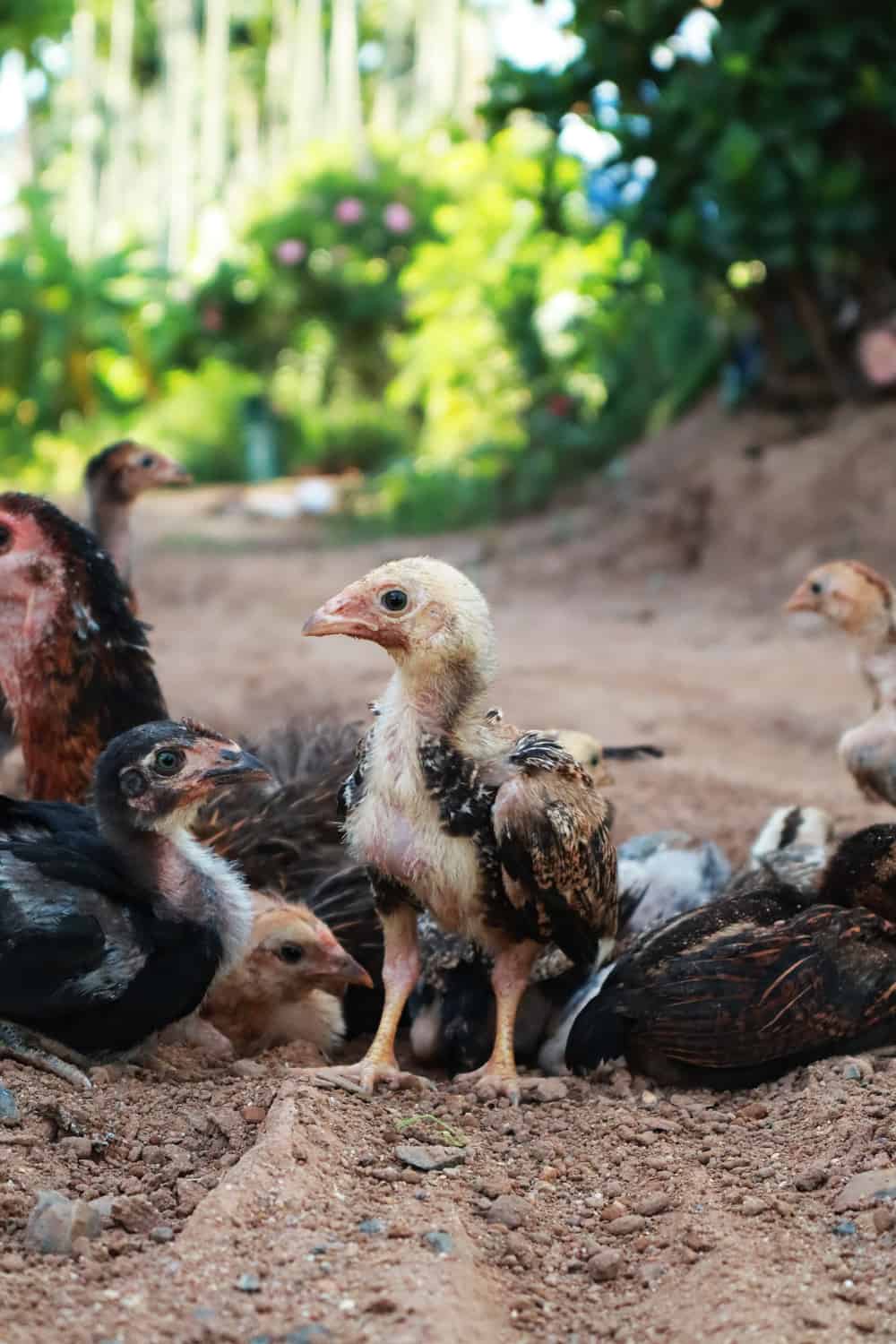
Some things to consider if you have backyard chickens
If you have a chicken, feed the eggs back to her. She needs nutrients to stay healthy and strong. Even if she initially produces more eggs than you can feedback to her, it’s important to leave the rotten eggs in her environment for a short period of time.
It shows the chicken that her eggs aren’t being taken away from her, so she’ll most likely slow down her production. Leave the eggs in her nest, this way she will see that she doesn’t need to be laying more.
Think about having to make an egg and the amount of energy that it takes. It takes a hen 24 hours to make one egg. She would be constantly working on the inside to be producing eggs for someone that is taking them away.
It’s easy to overlook this fact. But being vegan is about trying to put ourselves in the shoes of the animal. Laying an egg is a significant event, which we’ve played down as a culture to feel comfortable with the idea of eating eggs.
Chickens are social creatures that have a strong memory, and emotion influences their social behaviour. They can form affectionate bonds with other species and recognise their facial features and mourn the death of other birds.
With an idea that starts as a small venture, more and more people become greedy and want to exploit the animal for their own benefit. So next time you see a chicken as an egg-laying machine, maybe consider her needs before yours first. They are sentient beings just like we are and they don’t make eggs for us to take. Period.
And to answer the burning question on everyone’s lips, no you’re not vegan if you eat backyard eggs. It’s a personal choice at the end of the day, but calling yourself vegan and consuming eggs can be very misleading and confusing for others.
There’s enough confusion around veganism as it is, so let’s not add to that moral ambiguity. Veganism is a way of thinking and feeling that doesn’t exploit or use anything that comes from an animal, human or non-human.
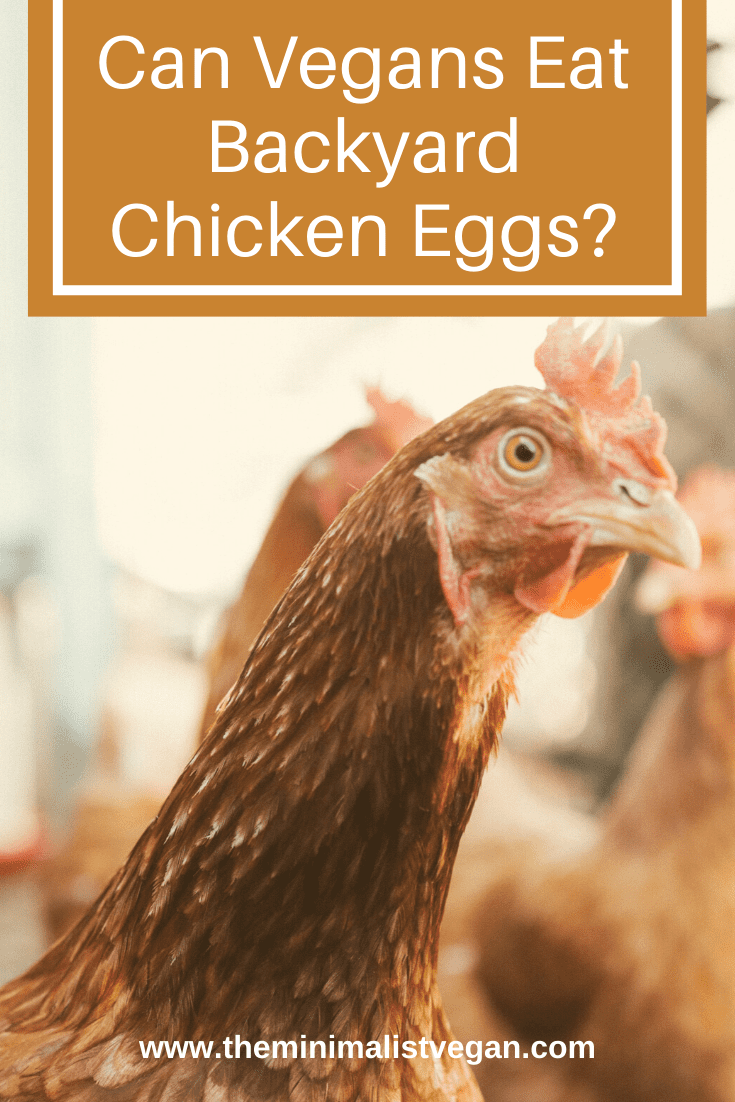
Other posts you’ll love:
- Is Honey Vegan?
- Extending The Definition of Veganism
- What Is Vegan Leather? The Ultimate Guide
- Is Alcohol Vegan? How To Approach Alcohol As a Vegan
- Is Silk Vegan? The Answer Lies In The Process

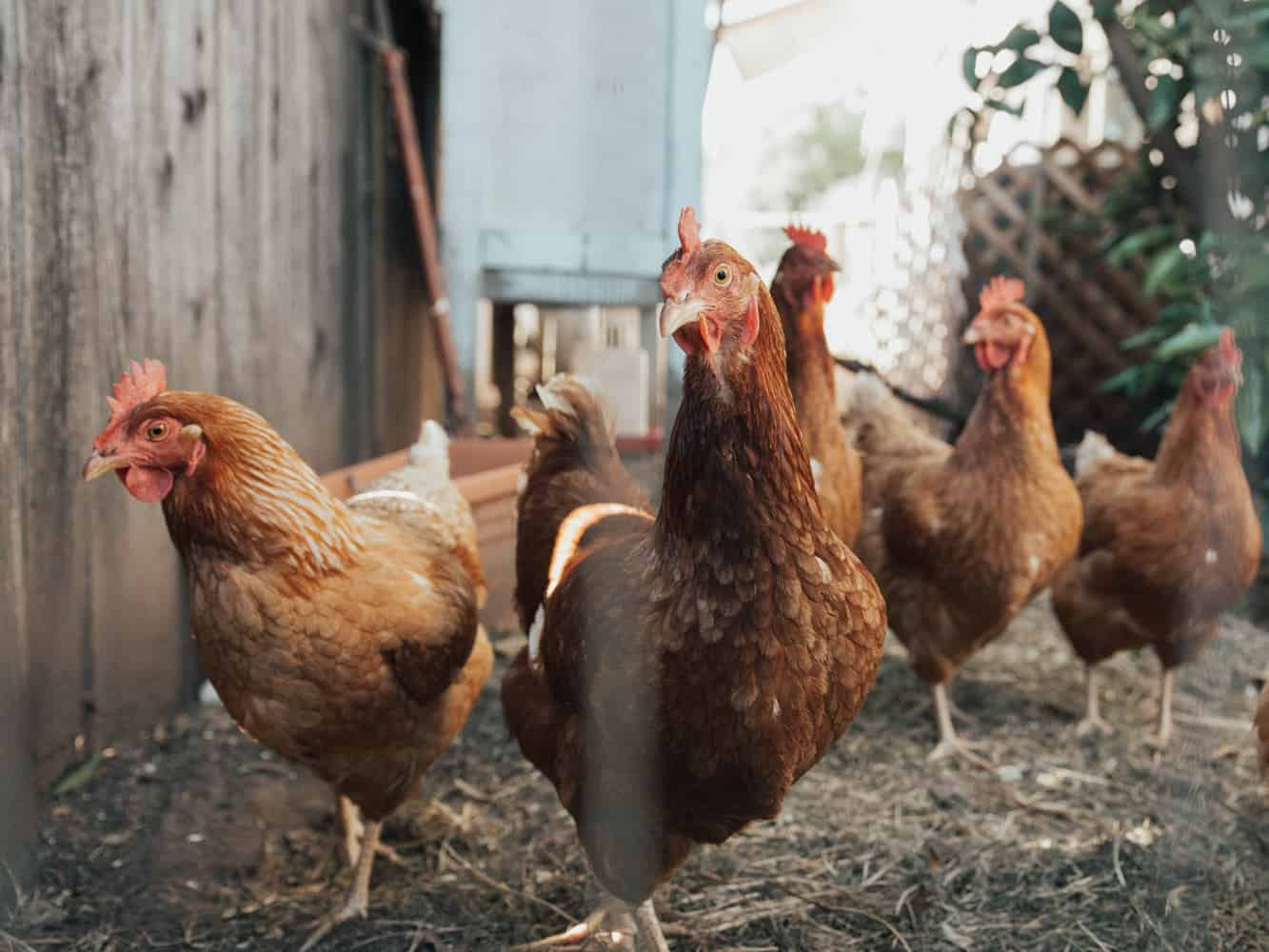
Very interesting! I have 3 rescue hens at home here in Spain and I recently had to pay 300 euros to treat one of them! I feed them their own egg, though sometimes there’s no need as they’ve figure out how to poke some themselves. However, the point on not taking their eggs.. they really WILL NOT move for days when they’re brooding and that worries me (I right now have one who hasn’t moved or eaten in 5 days). Hen owners on a vegan group encouraged me to remove the eggs and give them back to her as food, but you say that’s not the best way to go in terms of stress for the chicken? How would you solve this? Thanks in advance!!
Thanks for this article. It’s an awesome starting point for thinking about chickens. Where I fully agree is that buying eggs or chickens for consumption of eggs creates demand that means males are killed. The job of a “chicken sexer” is separate the live chicks into sex so the males can be killed. Rescue chickens I’m less convinced by your arguments. It’s a bold argument to say it’s like having a period every day – what is the research that shows making an egg in a hen has the same physical and emotional impact that it does in a human? Happy to hear that research. selective breeding is also problematic. I get that selective breeding is exploitation and shouldn’t happen in the first place. However the fact that hens now lay 350 eggs a year doesn’t of itself imply that this is painful or distressing. If the process of selective breeding has been done through natural variability then the fact of laying so many eggs may have no impact on the hen from a physiological point of view. I’m not suggesting that statement is true, but I’m suggesting there is no evidence presented here and I’d be interested in knowing whether it’s an adaption that was caused by manipulating hormones or whether it’s been a natural adaptation over time. Does the process of egg laying hurt? It obviously depletes calcium. I’ll head off and try and find some answers to these questions.
This is a well thought out post, you made some really great points. The idea that the relationship between an ‘owner’ and ‘their’ rescue chicken has to be one of business doesn’t quite sit right with me. I am wanting to rescue chickens, along with some goats and cows. My motivation for this is simply to provide them with a better life. I don’t see how, eating the egg of these chickens, considering they’re waste products is unethical or ‘non vegan’. For instance my relationship with family and friends can sometimes, without direct intent, be transactional. This wouldn’t mean I didn’t love my friend or family member. I would always do my upmost to help them independent of any business between them and myself. I also think seeing a business relationship as totally unethical brings up the debate of assistance dogs. A blind person clearly would benefit from the service of a dog, it is often the reason why they get a dog. This doesn’t however mean the blind person won’t love the dog and do their upmost to provide the dog with a fruitful life. The same could be said about therapy dogs etc. I’d love to know your thoughts on the matter! Thanks so much.
Hello there, I’m from Italy and I know that you have problems with the meat industry Wich sucks, problems that we in Europe have in minor ways, but have still, since McDonald’s is still selling meat (I dream of meatless fast foods, I know, wat a dreamer ?). but here we have also a parallel way to treat animals, it’s about caring both in raising them and feeding them, not because farmers loves their cattle (even if most of the time they do) but because animal products gets waaaaaaaaay better when animals are treated well. And with age, ence the reason they keep them waaay longer. For instance, you mention how eggs can break easily, and how backyard chikens suks because they came from “big chicken”. Here chicken are raised from generations, they are ealthy runners (very fast), their shells are very hard to crash, if you are not used to it you think the egg as a problem since its the third time you have hit, it’s cracked, but nothing is coming out? and I’ve never had a piece fall in while breaking them, the yolks are so resistant that you can literally pick them up without breaking them, but most of all, farmers respect their “periods” so sometimes during the year, no eggs, because the chiks don’t make enought. So no eggs for some time, who cares, I’m used to feed myself based on seasonal stuff anyway ? all of this blabla just to say that there are different ways of coexisting with animals, and a symbiotic relationship is the best way to go, keep animals that wouldn’t survive in nature safe and fed (we struggle with foxes too you know 🙂 ), take what you need from them in exange but always respect them just as much as you would respect yourself and never be greedy, otherwise, shitty product, and shitty products don’t sell ✌? btw all of this is hardly regulated so it’s impossible to get these kind of eggs in the stores, you need to go directly to the farmer where, if you want, you can see the chiks and what they feed them with, since they are always on sight, all of them ❤️
I’ve been adopting ex bat hens for about 7 years now through BHWT. They live their retirement happily in my garden and are extremely friendly and sociable both with myself, my children and my other pets. I’m not vegan but have been vegetarian since the age of 12 and we do consume the hens eggs. I just wanted to comment, that for our hens, leaving the eggs made no difference to their egg production, we left for around a week to see if this made a difference as one hen was laying very weak shelled eggs, but those that laid continued to lay on average one egg per day, and they still do, except on very rainy wet days, they don’t tend to lay daily then. We’ve always crushed their shell to give back to them and often make them scrambled eggs too which they love. They are very much part of our family and, in my opinion, not exploited at all, they have scraps from our kitchen and enjoy interactions with the family sometimes even popping in the house for a nosy around. In the past we’ve taken them to the vets in necessary but have also used the phone help lines provided by the BHWT to troubleshoot any health problems, as by their advice, taking them to the vets in itself can be an extremely stressful process which can be damaging to their health if they are poorly. We’ve nursed a few chickens back to health with Epsom salt spa baths and snuggling up in the house in a fluffy towel and being hand fed raspberries until they are back on their feet again. The eggs that we don’t require we give to family or friends and the cost of keeping our hens does outweigh the “egg benefit” if you were to try and compare the two, but that’s fine as they are also our pets and were re homed with that intention. I guess my point is, that our hens are part of our family, whether they lay eggs or not, and we feel no violation to them by consuming the eggs they do produce.
Hi Lisa, sorry I’m just catching up on comments. Thanks for sharing your experience with us. It does sound like your hens are part of your family, which is lovely, and I’ enjoy learning about different perspectives.
Hi, I think the article is well written. But I just want to point out one thing that isn’t really taken into consideration, being the idea that having a chicken as a pet and consuming the eggs is a business transaction. Why is this necessarily a bad thing? And why couldn’t this be a good thing? Veganism is often seen as a stance of privilege. Someone that is on the low income scale might not have the income to take on chickens solely as pets. But alternatively they could take on a chicken that would normally have their life shortened, sell the chicken’s eggs, and then use that money to keep the chicken healthy and happy. Whether or not you call that person vegan or you call the relationship a transaction is kind of moot if the chickens lead a happier life. And also the idea that a pet cat or dog is not a transaction is often wrong. Most people literally buy pets to give them love in their life and to fill a void. Or to teach their children responsibility. The idea that it’s some purely altruistic act is myopic, and though I’m sure it does happen, I would say that is the minority reason people really own pets.
Hi Krishna, thank you for taking the time to share your thoughts. You make some interesting points. However, I think there’s a distinct difference between profiting off an animal and exchanging your care for their love. The idea of chickens leading a better life as a justification to sell their eggs is similar to farming organic grass-fed beef—where the cow undoubtedly leads a better life. Still, ultimately they are bread for the consumption of their meat, milk, skin, etc. I don’t think this way of thinking is altruistic or unrealistic. We’ve been conditioned to a particular way of thinking to the point where topics like this don’t feel like a big deal. Nevertheless, I understand your position as to where we draw the line. Ultimately it comes down to whatever people are comfortable with. But I’m glad we get to have this dialogue.
My point is that it doesn’t matter so much if it’s purely altruistic or not if the chicken gets to live a full life and is treated well. I don’t think the same comparison can be made to grass fed beef, because in the end they are murdered. A better example would be someone who keeps cows for dairy and lets them live a full life and treats them with respect. The reason I brought this up is because I heard of someone that sells the chicken’s eggs so that they can buy the materials necessary to keep the chickens. While again, in an ideal world, we wouldn’t need to do that, but in this world I respect that person for doing that. Perhaps you missed my point about privilege, but not everyone can afford to take on chickens. If you have some land its nice having chickens around for many reasons, eggs being one benefit. Instead of only thinking of why people shouldn’t own hens for eggs, we should also be convincing people to keep them alive rather than kill them after they are not as productive. They can still lay eggs for 7 years. And then after that they are great to catch bugs, weed control, keep the soil healthy, make good mothers, and are better for watching out for predators. It’s important to be realistic as well as idealistic and I try to convince chicken owners to keep the hens around for longer. I appreciate folks that are living in ways that are closer to the land, I believe they are more intelligent than us and lead better lives. Anyways I do thank you for the conversation and found your article useful and appreciate your response. I do think it is a big deal and is why I am doing a lot of research on the topic and stopped eating store bought eggs. But do think its possible to do backyard chicken eggs respectfully. To me its not just about drawing a line (that seems meaningless to me) but what makes sense. Taking a chicken from the stream of a cruel system and giving it a FULL life is respectable and I have seen it done and always have such respect for that. I like seeing happy chickens at a rescue or my friend’s backyard.
Could you link the sources to the facts so when I share this info with non vegan people they don’t have any grounds for doubt. Thank you so much.
Hello,
This might be a stupid question, but what happens to the rotten egg, how long am I supposed to leave it there? I cannot risk letting it “explode” there because of the smell, my neighbours would hate me…
Thank you and Greetings from Freiburg, Germany
Hi Kerstin, I don’t think your question is stupid at all! And honestly, I don’t have an answer as I don’t have chicken’s personally. I suppose if I were in that position, I’d trial and see the impact of leaving eggs, and workshop from there. If you find a solution, please drop back in and let us know 🙂
Hi Abby, it wasn’t my intent to devalue the lives of chickens in this post, so thanks for point that out. Unfortunately, I couldn’t find any case studies (outside of chicken sanctuaries) of people like yourself genuinely keeping chickens as pets, without the desire to take their eggs. So it’s refreshing to see that you have that mindset, and if I choose to adopt chickens in the future, I will adopt a similar approach 🙂
Here in the US, it is common knowledge that male chicks are put in mechanical grinders, alive, to be killed.
If I ever adopted chickens I don’t know what I would do with the eggs, but buying chickens is definitely paying for abuse.
Yup, it’s a horrific practice as a result of supporting egg consumption.
Hi,
Great article! I’ve run this through my head over and over. I am/was a local truck driver in small Texas town. Where our trucks were kept parked at the local trck stop I saw many chicken and cattle trucks come in and park. It was horrible as the transport is almost as bad as the slaughter.
There are many egg and broiler houses around me. I also do rescue and have a small farm. Sometimes the chicken get out of their crates and fall to their demise on the hwy or are loose at truck stop and run over later. I have been seeing chickens dead on road most of my life because of this. I have rescued some about 40 years ago and a couple years ago crawled up on the truck and got a hen that was hanging upside down with foot caught. I put her in my enclosed horse trailer and was going to buy/build coop on my first days off. She didnt make it she died 2 days later and I thought she was ok I had no signs. I had a feeling it was because she was alone and her her life was spent crowded, but I’ll never know.
I am new vegan but wondered about the egg thing. I will do some research about if the egg production slows way down by leaving eggs longer. I know these chickens have alot of their natural traits bred out. I would like to rescue some more making sure that I dont have a single bird by herself.
Thanks again for this, the egg production is something I never thought about reversing. Also their beaks are burned so they dont mutilate the others so I’m not sure about them eating their own eggs. My plans were to eat the eggs or feed to my dogs as I dont want them wasted. My chickens I had years before I ground and fed their shells back to them for calcium but I also had grit and ground oyster shells available.
I was going to do this without advertising it because I thought it would make the whole egg production thing seem more ok.
Now my thoughts are if people are willing to become vegan but they also would like to contribute to the rescue of hens and maybe even a rooster (of course eggs have to be gathered and not allowed to form) would or would not this be more ethical as eggs would not be off the menu allowing more people to cross over to at least vegetarian, more chickens would be rescued and cared for by people who care??
Thoughts on this would be appreciated. I used the word vegan but I dont believe someone who eats eggs is vegan but vegetarian.
Thank you!
Hi Brenda, thank you so much for taking the time to leave your comments (I’ll catch up with you on the other posts). We appreciate your passion, and there’s a lot to learn from your experiences.
Appropriately dealing with the overflow of eggs from pet chickens is a tricky area. I mean, sure, is the extraction of eggs with this considered approach more ethical than the alternatives? For sure. And if it’s going to make vegetarianism and eventually veganism more accessible to people, than I’m all for it!
But does it mean it’s ethical? As you can probably guess from the crux of this article, we don’t think so. The moment we think about intentionally extracting possessions from animals that’s not ours, we enter an exploitative relationship, no matter how “harmless” it may seem.
With your experience with hens and roosters, I wonder if you could trial leaving eggs untouched within your community, to see how the chickens respond, best ways to deal with the eggs, and the overall impact?
Thanks again,
Michael
This article is excellent. Thank you!
Thanks, Darrell, we’re glad you found it useful 🙂
NO Vegans do not eat animal products whenever possible and do not support animal exploitation. There is a definition. People that eat eggs would be some type of vegetarian …. they are not vegan and are not even plant based!
We agree with you, Sammie 🙂 But we also recognise how eggs from backyard chickens can cause some confusion.
My concern is that not every egg from an egg laying house is a hen. Statistically 50% would be roosters. Where are all the boys?
If you get a chicken and eat its eggs, and take immaculate care of it, and are willing to splunk down $5,000 if it gets sick, there is still a male that was born but deemed undesirable.
This is such a good point, Kathryn, and we’ll be sure to include it in our next revision of this article. Roosters get the short-end of the stick, and it’s not talked about enough. Thanks for sharing your concerns.
So good information. Even though I don’t consume eggs since I am fully plantbased, I have heard this statements along with honey. It’s so well written and I understood so much! I just found you. I am new to your blogs. Thanks!
Thanks, Samip! I’m glad you found the post to be informative. Have a lovely week!
Thanks for this great and informative article about eggs. I wanted to share this resource with you as well … https://www.considertheegg.org
BeVegan!
Rob
Amazing webpage explaining the impact of eggs on chickens! Thanks for sharing and for all of the work you’re involved in to help animals 🙂
Love it, Alicia! Kudos for staying persistent.
I was literally just having a conversation with my friend about backyard eggs and hens and this has completely changed my mind! It’s great to hear recommendations about to do with the eggs as well, as I was interested in taking on some chickens. Thank you for sharing!
So glad this post came at a good time, Courtney! Thanks for tuning in and sharing your experience. I’m sure the chooks would be thrilled to be part of your life as companions 🙂
What an excellent summary! Thank you for taking the time to write this succinct and clear explanation of the issue with backyard eggs.
You may have heard of Penny? She is a hen that was rescued by local activist Geoff Regier – a great guy. He recently had her fitted with an implant to control laying (think of it as chicken birth control) which will reduce the health issues for her. Read more here: https://www.facebook.com/geoff.regier/posts/10161595666675402
Responsible adoptive parents of rescue hens should consider doing the same if applicable/possible in their area.
Thanks, Briggite! Oh wow. No, I hadn’t heard of Penny until now. What an inspiring story! I had no idea you could get such an implant. Thank for sharing 🙂
I boycott Facebook so can’t read the article about chicken birth control, but I’d imaging it involved some sort of hormone. If so, birth control pills, or implants are definitely not a good thing for human health, so I doubt such an implant would be good for a chicken.
I volunteer for a local Wildlife Center that occasionally gets chickens that need good homes. A rescued chicken no more supports breeding than a rescued dog or cat. I see nothing wrong with providing a home for a chicken and using the eggs if one is inclined. I wouldn’t say I was vegan if I ate them, though.
Chickens should probably not be fed a high-grain diet, which they’d never get in the wild, and which may contribute to the excess egg production. I’d think greens, and some fruits, with bugs and worms found in the backyard would be the most natural diet.
I would definitely pay to take care of a pet chicken. I consider any animal I’d adopt to be a famiiy member, not a food source.
Hi Cara, thanks for sharing your experience with us. I agree with you regarding nutrition. And love your final sentence about seeing chicken adoption as a family member.
As you’ve written, I’ve also heard (probably from the disclosure podcast too) that if you take away the eggs the hens will lay more, but I can’t find evidence for this – do you have a source?
I’m wanting to reply to Cheap Lazy Vegan’s new vid where she says saved hens are most likely to not be an ethical concern, but I think them laying more (if true) makes it unethical
Hi there, unfortunately, I don’t have a direct source regarding hens wanting to lay more eggs. However, you could perhaps use the discrepancy between the rate of eggs laid with human intervention versus without? Hope this helps as you build a response.
Brilliant post, well explained as always. I went to an animal sanctuary and asked them about the eggs from the rescued hens and said they mashed the eggs into some type of grain mash and fed it back to the hens. We had a few back yard hens and I would soft or hard boil the eggs, mash it with the grain and give it to them, they loved it. But you are definitely right about backyard hens being an exchange type of pet and not like a cat or dog.
Thanks, Jenni! Oh, that’s handy to know. Do you recall what type of grain it was that you used to mix with the eggs?